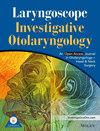Association of Life's Essential 8 With Hearing Loss and Tinnitus in U.S. Adults
Abstract
Objective
To investigate the association between cardiovascular health, measured by Life's Essential 8 (LE8) score, and hearing loss and tinnitus among U.S. adults.
Methods
A cross-sectional analysis was conducted on 4624 adults (≥ 20 years) from NHANES 2005–2018 cycles. Cardiovascular health was assessed via the LE8 score, encompassing eight health behaviors and factors. Audiometry-measured speech-frequency hearing loss, defined as pure-tone average (PTA) ≥ 20 dB in the better ear at 500–4000 Hz, and subjective hearing loss and tinnitus were assessed using self-reported questionnaires. Multivariable logistic regression models adjusted for confounders examined associations between LE8 scores and auditory conditions. Additional analyses included restricted cubic spline regression, subgroup, and sensitivity analyses.
Results
Higher LE8 scores, indicating better cardiovascular health, were significantly associated with lower odds of audiometry-measured speech-frequency hearing loss (adjusted OR: 0.84; 95% CI: 0.77–0.92), subjective hearing loss (adjusted OR: 0.82; 95% CI: 0.77–0.88), and tinnitus (adjusted OR: 0.88; 95% CI: 0.81–0.96). Subgroup analyses showed consistent associations for audiometry-measured hearing loss and tinnitus across demographic strata, while findings for subjective hearing loss varied by sex. Sensitivity analyses confirmed the robustness of the findings.
Conclusions
Better cardiovascular health, as measured by LE8 score, is associated with lower odds of hearing loss and tinnitus among U.S. adults. These findings suggest that the LE8 score may serve as a valuable integrated metric for evaluating cardiovascular health in relation to auditory outcomes.
Level of Evidence
2b.


 求助内容:
求助内容: 应助结果提醒方式:
应助结果提醒方式:


